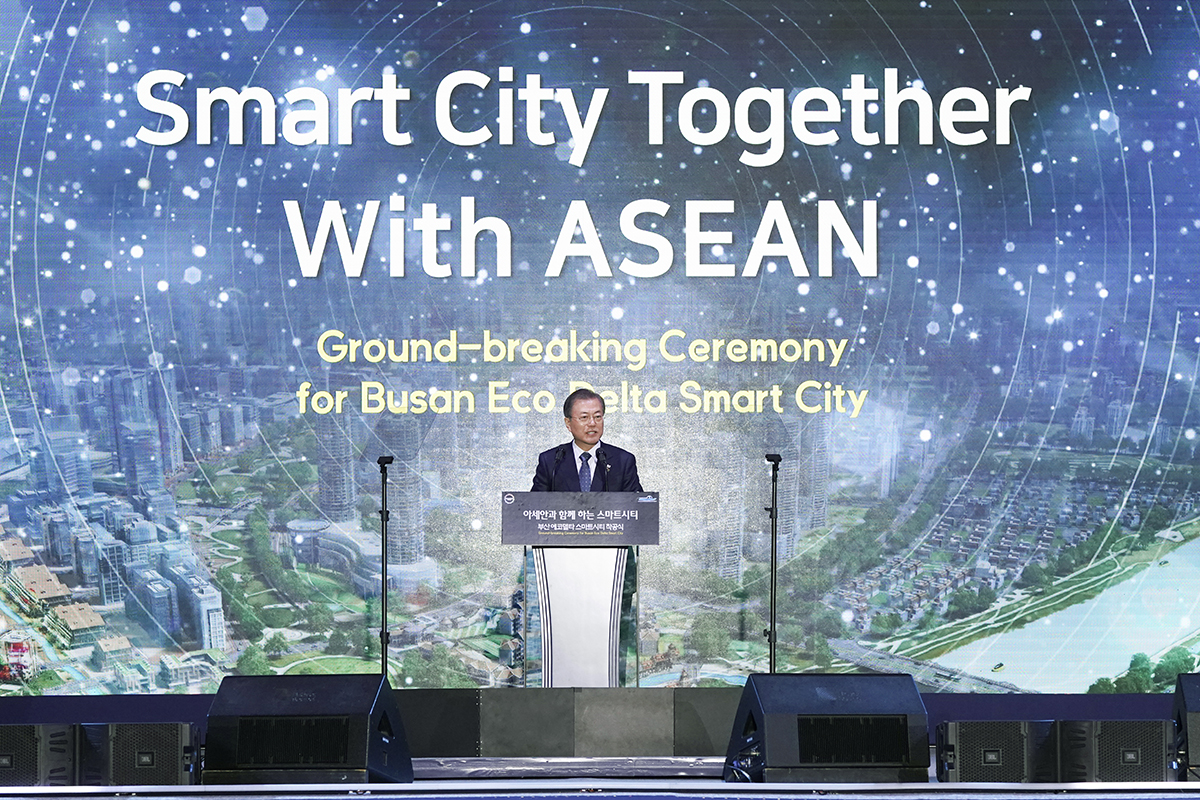- 한국어
- English
- 日本語
- 中文
- العربية
- Español
- Français
- Deutsch
- Pусский
- Tiếng Việt
- Indonesian
By Honorary Reporter Alexandra Taseva from Bulgaria

President Moon Jae-in on Nov. 24 delivers a congratulatory speech at the groundbreaking ceremony of the Busan Eco Delta Smart City. (Cheong Wa Dae)
With its fast-growing population reaching more than 3.5 million, Busan, which hosted the ASEAN (Association of Southeast Asian Nations)-Republic of Korea Commemorative Summit last month, has started the project Busan Eco Delta Smart City.
President Moon Jae-in on Nov. 24 participated in the groundbreaking ceremony and delivered a congratulatory speech that stressed the importance of the smart city.
During the Busan summit, the Smart City Fair held from Nov. 25-27 showed the results of cooperation between ASEAN and Korea as well as development projects featuring smart cities in the region.
With Oxford Dictionaries designating "climate emergency" as its "word of the year," the smart city and recycling technologies shown in the fair seem necessary for the future of every city.

Edward Yang, director of Center for Future City at Korea Water Resources Corp. (Alexandra Taseva)
One of the biggest Korean companies taking part in the fair, Korea Water Resources Corp., represented one of the planet's most valuable resources. Edward Yang, director of the company's Centre for Future City, had more to say about his organization's innovative technology.
"It’s essential for a city to expand and sustain water. The Busan Eco Delta Smart City will be the first case of its kind in using the ideal system of water circulation that enables high quality potable water from dams with no pollution. On an urban scale, we recycle 100% of rain and wastewater. This is what our innovative technology includes," he said.
The overall city project will cover 11.7 square km and comprise a mixture of residential, retail, office and industrial spaces in the process of recycling water. But what about the process?
"This is a combination of different technologies, the first one being rain-proofing and a remote disaster system. It makes the city safe from flooding while capturing rainwater," Yang said. "The second is low impact development. When planning urban development, it's crucial to carefully decide how to supply and recycle water. This is another new technology we use here. Next, we have eco filtering. This is the way we define rainwater and river resources so that they become drinkable water. Such technology was installed in Busan from early this year. And finally we have a smart water treatment plant that is decentralized and located near neighborhoods. This is how we provide high quality water."

Cho Young-tae, director of LH Smart City Research Center. (Alexandra Taseva)
Another big factor in climate change is the amount of waste produced daily. Korea's policy toward waste, known as jongryangje (pay as you go), is one of the most effective in the world. Everyone nationwide regardless of location or occupation must separate trash into four types: landfill, organic, recyclable and large items. Recyclable waste such as paper, plastics and glass must be separated before disposal.
At the fair, Cho Young-tae, director of the LH Smart City Research Center, explained how Korea's composting technology works.
"Korea has a tradition of growing and eating vegetables. The technology involves recycling that transforms food waste into compost for use in growing vegetables. We can call this biotechnology," Cho said.
The Ministry of Environment's enforcement of this recycling policy has led to Korea recycling up to 95% of its food waste.
Cho said, "This new biotechnology is most effective in cities and at public housing or commercial facilities, where masses of people live together and consume a lot of food. We recommend that this facility is used by children at schools because of its use in environmental education. Food waste used to be an urban problem in Korea, but we're utilizing biotechnology to solve this problem through recycling that turns food waste into compost, which is a productive resource."
Due to the relatively large population living in a small territory, Korea has found a middle way to achieve high efficiency in waste treatment and recycling. This recycling system also incurs no additional cost while improving quality of life in Korean cities, and could do the same in cities worldwide.
chaey0726@korea.kr
*This article is written by a Korea.net Honorary Reporter. Our group of Honorary Reporters are from all around the world, and they share with Korea.net their love and passion for all things Korean